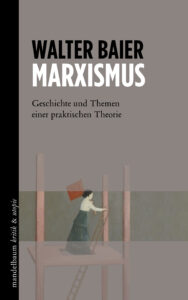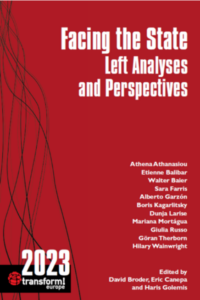Walter Baier’s recently published book “Marxismus. Geschichte und Themen einer praktischen Theorie” (Marxism. History and Issues of a Practical Theory) represents one of the most promising attempts to renew European communist thinking.

The author of this brilliant overview is an economist by training, a former leader of the Austrian Communist Party, coordinator of the European network transform! europe, elected president of the European Left Party in 2023. An atypical communist, he defines himself, with a touch of irony, as “the last of the Austro-Marxists”; indeed, among his main references we find Otto Bauer, but also Antonio Gramsci and the Spanish dissident communist Fernando Claudin. But the guiding stars of his navigation through the history of Marxism – or rather, as he insists, Marxisms in the plural – are the Eleventh Thesis on Feuerbach and the dialectical method.
The first chapter of the book deals with the writings of Marx and the ‘classical’ Marxists. As per his training, Baier is primarily interested in Marx’s economic writings; he does not limit himself, as is often done, to the first volume of Capital, but also analyses the other two volumes, which present the movement of capital as well as the theories of imperialism and monopoly capitalism. If the discussion of Marx’s political writings is too brief, the analysis of Lenin and the Russian revolutionary experience is very interesting, drawing on the critique of Rosa Luxemburg, who, while showing solidarity with the Bolsheviks, was critical of their suppression of democracy and civil liberties. According to Baier, the dictatorship of the single party and its increasingly authoritarian internal structure after Lenin’s death were the causes of the Stalinist phenomenon, which he defines, drawing on Trotsky’s analyses, as an expression of the power of the bureaucracy.
Another chapter is devoted to a subject that has, unfortunately, regained great present-day relevance: the Marxist theories of fascism. The contributions of Walter Benjamin, György Lukács, August Thalheimer, Wilhelm Reich and Nicos Poulantzas are discussed, as well as that of Otto Bauer, according to whom fascism is not a response to a revolutionary threat, but a movement that aims to crush all workers’ conquests, even the most moderate ones. For Walter Baier, the concept of ‘Bonapartism’, used by several of these authors, seems of little relevance.
How should fascism be fought? Already in 1923 Clara Zetkin called for an anti-fascist united front of all workers’ organisations; it was only in 1935 that the Communist International, under the aegis of Georgi Dmitrov, abandoned the pernicious doctrine of ‘social-fascism’ and called for the creation of a People’s Front against fascism. This was a clear-sighted orientation, although it was abandoned between 1939 and 1941, the period of the Nazi-Soviet pact, only to reappear after 1941, following Hitler’s invasion of the USSR. Missing from this interesting and pluralist critical study is Trotsky’s contribution to the analysis of the fascist phenomenon and his call for a united workers’ front against Nazism.
The penultimate chapter deals with the fate of communism in Europe after the Second World War. The communist movement initially experienced a great expansion, thanks in particular to its role in the resistance to the Nazi occupation, but from 1948 there were the Stalinist trials in Eastern Europe, which did not hesitate to draw on anti-Semitic myths – according to the author, one of the darkest pages in the history of European communism. The Prague Spring, on the other hand, represented the most serious attempt to overcome the Stalinist model; among the intellectuals who prepared this movement, Baier highlights the work of Radovan Richta, who, as early as 1966, formulated a warning of remarkable contemporary relevance: “From the Marxist point of view, the point is not only to overthrow the relations of production, but the entire industrial civilisation created by capitalism.”
The author’s sympathies are with Eurocommunism, but he nonetheless acknowledges their hesitations over what to say about the Soviet regime; he takes up Claudín’s argument that the concept of an undemocratic socialism is in itself contradictory. He considers that the tactics of the Eurocommunists in Italy, France, and Spain were a risky path, hesitating between structural reforms opening the way to socialism, and reformist politics of adaptation to capitalism.
The contribution of ‘Western Marxism’ —Lukács, Korsch, Gramsci, the Frankfurt School, Walter Benjamin, Jean-Paul Sartre, etc. — is mentioned, but in too summary a manner. As for the non-European communist movement, apart from Mao-Tse-Tung and the Chinese revolution, it is practically absent: neither the Vietnamese resistance to imperialism, nor the Cuban revolution, nor, in another register, the Chilean experience with Allende or the extermination of the Indonesian communists, are discussed. This is probably the main gap in this book.
The last chapter, under the banner of Rosa Luxemburg’s famous slogan –’Socialism or Barbarism’— is one of the most interesting in the book. First of all, because it very explicitly rejects Eurocentrism, making extensive reference to the writings of Franz Fanon and Samir Amin. This is a kind of corrective to the shortcomings noted above. Moreover, by the importance it gives to liberation theology in Latin America and to the Latin-American Pope’s (Francis’s) critique of the dominant economic system that ‘sacrifices human beings to the idol of money’. Finally, the decisive place that Baier attributes, in his conclusion, to the ecological crisis, and to the ecosocialist alternative. (Soviet) state socialism and social democracy privileged economic growth, no matter the ecological cost. Ecosocialism proposes to go beyond that productivist vision which counterposes the productive forces, taken as bearers of progress, to the conservative relations of production: rather, the whole productive apparatus must be radically transformed.
Paraphrasing a famous formula of Max Horkheimer’s, ‘if you don’t want to talk about capitalism, you have nothing to say about fascism!’ – Walter Baier concludes: ‘If you don’t want to talk about capitalism, patriarchy and colonialism, you have little to say about the climate crisis!’
Beyond its limitations, this book represents one of the most promising attempts to renew European communist thinking.
Walter Baier: Marxismus. Geschichte und Themen einer praktischen Theorie.
22.00 €, 312 pages, Format: 15 x 24, ISBN: 978385476-912-5,
Mandelbaum edition, Vienna, Dec. 2022



